剑桥unit11
剑桥少儿英语一级上Unit11-Our-family-tree.
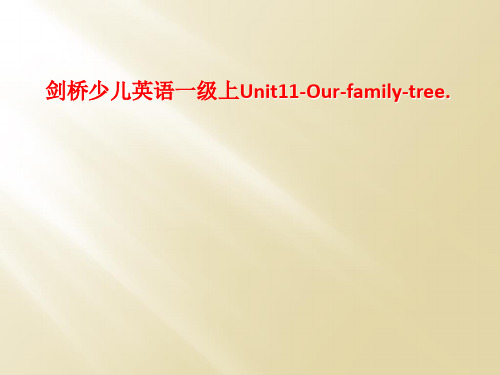
practice
• nuelc • uatn • scuion
uncle aunt
cousin
• pnhewe • niece
nephew niece
• aernpst
parents
• rgrapaensndt
grandparents
Introduction (介绍) This is my dad.
vocabulary (词汇)
He is reading a newspaper. 他正在看报纸
read[ri:d] 阅读
newspaper['njuːzpeɪpə] 报纸
read a newspaper
看报纸
reading a newspaper 正在看报纸
vocabulary (词汇)
watch[wɒtʃ] 观看
3. fun 有趣的 [fʌn]
4. but 但是;而是;然而[bʌt]
5. easy 容易的 ['iːzɪ]
6. busy 繁忙的 ['bɪzɪ]
7. give 给
[gɪv]
8. all 全部的,所有的 [ɔːl] 9. pingpong ball 乒乓球
['pɪŋpɔŋ] [bɔːl] 10. take away 拿走,取走
vocabulary (词汇)
She is holding a doll. 她正在抱一个洋娃娃。
hold [həʊld]
持有;拥有; 握住,抓住;抱住;
doll [dɒl]
洋娃娃,玩偶
hold a doll
抱一个洋娃娃
holding a doll 正在抱一个洋娃娃
剑桥少儿英语Unit11WillyoucometoourEnglishparty课件(1)
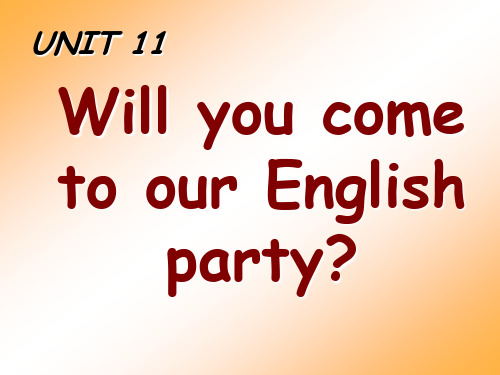
Will you come to our English
party?
What do we usually do before we have an English party?
• 1. put lots of s and balloons and make our classroom more beautiful
把根在下据下列老列句师句子的子变要的成求后否一把面定般下加句疑列上:问句一句子个:变反成意特疑殊问疑:问句:
• 1.Daniel and Kitty are going to buy food. • 2.I ‘m going to bring my cousin to the
party. • 3.Father will take me to the Palace
to 9:00 am and from 2:00 pm to
4:00 pm.
• Tom usually_w_a_tc_h_e_s (watch) TV at
home with his little brother.
• It’s 7 o’clock now.
Mother_is_c_o_o_k_in_g(cook) dinner for us.
• 6.在含有条件状语从句或时间状语从句
的复合句中,从句用一般现在时,主句 用将来时,且用will而不用be going to。
如:
• Mum will go to Beijing if it doesn’t rain tomorrow.
• When you get home, you’ll find a new bike in your garden.
• tomorrow • tonight • in a few minutes • in the future • in five years
剑桥少儿英语预备级下册BUnit11

Passage课文
①Hi,there! Where are you going?
嗨,你们好, 你们要去哪?
②How are you going to Shanghai? What about you? 我们要去上海,你呢?
③We are going to Kunming 我们要去昆明。
Chant and act 唱唱跳跳
①Where are you going?
你要去哪?
②I am going to Dalian.
我要去大连。
③How are you going there? 你怎么去那里?
④I'm going there by ship.
我乘船去。
Thank you !
Where are you going?
I am going to the Great Wall.
Where are you going?
I am going to bookshop.
Where are you going?
Where are you going?
• Where are you going? • I'm going to Dalian.
Unit 11
Where are you going?
bus
car
ship
boat
①bus 公交车 ②car 小汽车 ③jeep 吉普车 ④bike 自行车 ⑤train 火车
⑥boat 小船 ⑦ship 轮船
⑧plane 飞机
Where are you going?
I am going to Beijing.
剑桥少儿英语一级下册unit_11(有两个课时)
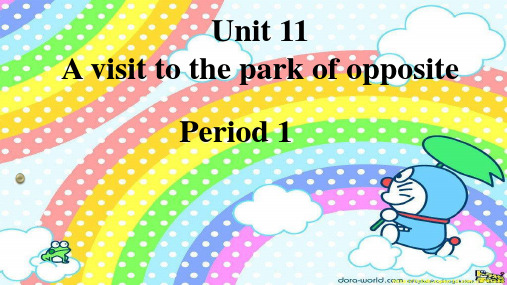
Look, read, draw and write.
Draw the opposite and write the words.
• Homework: • 1.单词3+1,并听写。 • 2.听读签U11,背U10。
Thank you !
Look and say.
The girl is very happy, but the boy is angry. The shirt is new, but the shoes are old. The elephant is big and the mouse is small.
The black car is long and the orange car is short.
Look right!—Look left! Look up!—Look down! Put your arms up!—Put your arms down! Hands up!—Hands down! Run—Walk! Stamp your left foot Touch your right ear Stand up
I can see a tall building and a short cake house.
I can see a long car and a short car.
I can see a big bus and a small bus.
I can see a big ticket office and a small ticket office.
• ow • cow brown how • down town flower • ow [aʊ]
3.Listen, point and read.
剑桥国际英语教程入门级11单元省名师优质课赛课获奖课件市赛课一等奖课件
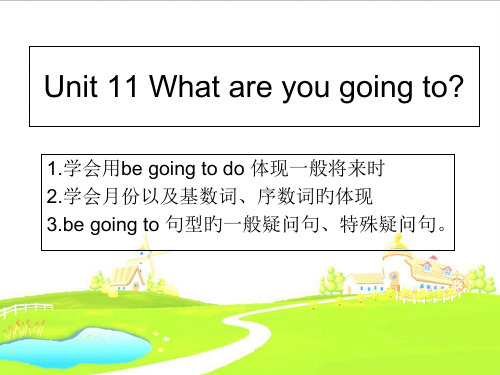
be going to句型旳一般疑问句、特殊疑问句
Tom is going to celebrate his birthday. 一般疑问句把be动词提前 Is Tom going to celebrate his birthday? Yes,he is./ No, he isn't 特殊疑问句=特殊疑问词+一般疑问句
新年 情人节 独立日 万圣节 感恩节 情人节
教师节 国庆节
小朋友节 植树节 建军节
• 特殊疑问句=特殊疑问词+一般疑问句 • What are you going to do? • Where are you going? • How are you going there? • Who is going to be there?
一般将来时常与下列短语连用
am not going to do are going to have
are is going to be
is
going to have going to start
is going to end
are
going to invite
are going to ask
翻译句子: 1ቤተ መጻሕፍቲ ባይዱ 我打算明天和朋友去野炊。 I__ ___ ____ have a picnic with my friends
2、 下个星期一你打算去干嘛? 我想去打篮球。 What ________ ________ _________ _________ _________ next Monday?
剑桥国际英语教程1unit11单词和句子默写对应版

第十一单元:It’s a very exciting place!Topic: Cities & sights城市和风景词汇:Positive negative1. beautiful 漂亮的2. cheap 便宜的3. clean 干净的4. interesting 有趣的5. quiet 安静的6. relaxing 放松的7. safe 安全的8. spacious有空间的;宽敞的empty adj. 空的9.fantastic adj. 极好的;大得难以置信的;10.busy 繁忙的9.ugly丑陋的10.expensive昂贵的11. polluted污染的12. boring无聊的13. noisy喧嚣的14. stressful有压力的15. dangerous危险的16..Crowded 拥挤的17.Hustle and bustle: 熙熙攘攘18. lifeless 毫无活力的bargain n. 交易,买卖,物美价廉的东西vi. 议价vt. 议价交易beach n. 海滩v. 拖(船)上岸vt. 使船冲上滩crowded adj. 拥挤的definitely adj. 明确地, 确切地adv. 肯定地delicious adj. 可口的, 美味的efficient adj. 效率高的,有能力的event n. 大事, 事件, 项目, 活动extremelyadv. 极其, 非常guide vt.引路;指导;操纵;影响n.指导者;向导;导游;有指导意义的事物harbor n. 海港,避难所vt. 庇护,心怀,窝藏vi. 进入避祸所,生存historical adj. 与历史有关的hometown n. 家乡however adv. 然而conj. 然而, 可是, 不过inexpensive adj. 花费不多的,廉价的information n. 信息, 情报, 新闻, 资料, 询问local a dj. 地方性的,当地的,局部的[计算机] 局部的maybe adv. 大概,也许n. 不确定性nightclub n. 夜总会noisy adj. 喧闹的,嘈杂的n. 嘈杂声,响声outside adv. 在外面n.&adj. 外部prep. 在...外pron. 在...外边pollute v. 弄脏,污染vt. 污染quietn. 安静,闲适,平静adj. 安静的,静止的,宁静的adv. 安静地vt. &vi. 使...平静,使...安心recommend vt. 建议, 推荐, 劝告vt. 使成为可取, 使受欢迎relaxing adj. 轻松的动词relax的现在分词rent n. 租金v. 租vi. 出租vt. 出租,租用scenery n. 布景,风景,背景sight n. 景观, 视力, 眼界vt. 看见, 观看vi. 瞄准somewhat adv.稍微;有点;达到某种程度n.少量;某些数量;某种程度souvenir n. 纪念品stressful adj. 紧张的, 压力重的subway n. 地铁summer adj. 夏季的n. 夏天, 全盛期, 年vi. 度过夏天vt. 在夏天保存或存放, 放(羊/牛) supermarket n. 超级市场taxi n. 计程车,出租汽车v. 用出租车运送,乘计程车,(飞机)滑行though adv. 可是,然而,不过conj. 尽管,虽然prep. 但.ugly adj. 丑陋的, 难看的visitor n. 参观者, 访问者,访客farm:农场Physical work: 体力劳动Healthy: 健康的Current: 当前的definitely: 肯定地;确切地traditional, 传统的ancient: 古代的destination:目的地perform: 表演tango: 探戈舞Ballet: 芭蕾cruise: 巡游foreigner: 外国人birthplace: 诞生地capital: 首都suburb: 郊外canal: 运河castle: 城堡And: 表连接But: 表转折However: 表转折Though: 表转折fantastic=terrific=wonderful: 棒极了rather相反,pretty十分maybe也许,quite相当somewhat有些Adj.+ly 构成Slowly慢慢地Quickly很快Extremely极其Really真的Fairly相当Deeply深深fantastic:棒极了Reasonable合理的Fairly big: 相当大的Sound+adj.: 听起来Plan a trip:计划旅游Really nice真的很不错Fairly big相当大的Very expensive非常昂贵的Too noisy太吵了Pretty busy很忙Somewhat deep有点深Extremely large非常大的One of…: …之一So far: 到目前为止be crowded with: 充满... ...Carnaval狂欢节(巴西)Ginza Shopping District 南京路购物街(上海)Hollywood Walk of Fame好莱坞星光大道The Tour de France 环法自行车赛Bund: (上海)外滩Buenos Aires: 布宜诺斯艾利斯(阿根廷首都)Calle Florida: 弗罗里达街(服装饰品商店较为集中的地方)Tigre: 老虎洲Parana River delta:阿根廷巴拉那三角洲National Museum: 国家博物馆Palace of Fine Arts: 艺术宫Pyramid of the Sun: 太阳神金字塔Prague: 布拉格cultural event: 文化事件Dragon Boat Festival: 端午节San juan, Puerto Rico. 胡胜安,波多黎各句型:1.这个城市怎么样?What is the city like?城市怎么样?How is the city?那是一个有趣的地方吗?Is it an interesting place?我从来没有去过那里。
最新最全剑桥一级上册Unit11
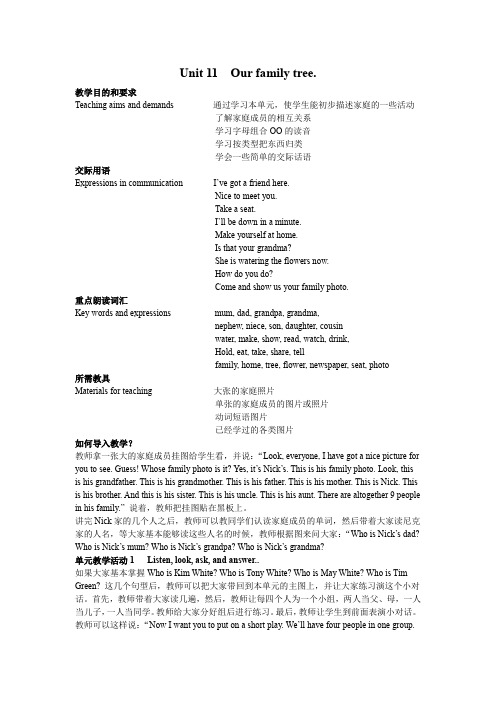
Unit 11 Our family tree.教学目的和要求Teaching aims and demands 通过学习本单元,使学生能初步描述家庭的一些活动了解家庭成员的相互关系学习字母组合OO的读音学习按类型把东西归类学会一些简单的交际话语交际用语Expressions in communication I’ve got a friend here.Nice to meet you.Take a seat.I’ll be do wn in a minute.Make yourself at home.Is that your grandma?She is watering the flowers now.How do you do?Come and show us your family photo.重点朗读词汇Key words and expressions mum, dad, grandpa, grandma,nephew, niece, son, daughter, cousinwater, make, show, read, watch, drink,Hold, eat, take, share, tellfamily, home, tree, flower, newspaper, seat, photo所需教具Materials for teaching 大张的家庭照片单张的家庭成员的图片或照片动词短语图片已经学过的各类图片如何导入教学?教师拿一张大的家庭成员挂图给学生看,并说:“Look, everyone, I have got a nice picture for you to see. Guess! Whose family photo is it? Yes, it’s Nick’s. This is his family photo. Look, this is his grandfather. This is his grandmother. This is his father. This is his mother. This is Nick. This is his brother. And this is his sister. This is his uncle. This is his aunt. There are altogether 9 people in his family.” 说着,教师把挂图贴在黑板上。
剑桥少儿英语预备级Unit11Meetingnewfriends课件(共15张)

• Aa在f, n, sk, ph, sp, ss, st, th 前读“阿”音。
• after • ask • grasp • class • fast • father·····
•I • you • he • she • it • we • they
我 你 他 她 它 我们 他们
我用am,你用are,
• Nice to meet you!= Glad to meet you!
• Who is he? 他是谁? • He is Bill. 他是Bill。
• Who is she? 她是谁? • She is Pat. 她是Pat。
• Good morning! • 早上好! • Good afternoon! • 下午好! • Good evening! • 晚上好!
UNIT 11
Meeting new friends 认识新朋友
• greet • glad • meet • new
• 问候 • 高兴地 • 认识 • 新的
• friend • nice • who • a.m. • p.m.
• 朋友 • 美好的 •谁 • 上午 • 下午
• wh在一起,大多数情况下 字母h不发音,white;
• ①Hello, Panda Pandy! • 你好,XXX潘迪! • ②Hi, glad to meet you! • 嗨,很高兴认识你!
• ①Hi, Monkey Munchy! • 嗨,小猴子蒙奇! • ②Glad to meet you! • 很高兴认识你!
• Hi!嗨! • Hi!Nice to meet you! • 嗨!很高兴认识你!
• 只有后面接O的时候,字母 w不发音,who。
剑桥英语《Unit 11 Its really worth seeing》详细讲解课件
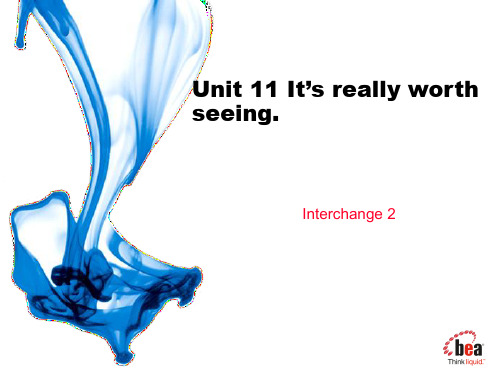
These two buildings were used to host the 2008 Olympic in Beijing.
Beautiful night view
The Eiffel Tower was built for Universal Exhibition 1889 Paris France.
We make theseare oftenin Beijing. them in class. Computers machines used by
These machines are made in Beijing.
被动语态的时态是由be的时态决定的, be是什么时态,全句就是什么时态,be动 词后面的过去分词不变。
They built the tall building last year.
The good care of his was built by them He tooktall building little brotHis little brother was taken good care of by him yesterday. We cleaned our classroom just now. Our classroom was cleaned by us just now. This room was used for resting by them.
They used this room for resting.
3.一般将来时的被动语态结构:
will be+过去分词
1.They will finish the work in ten days.
The work will be finished by them in ten days
剑桥国际英语教程(入门级)Unit 11
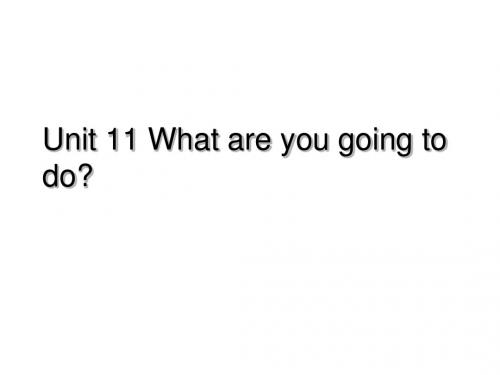
• 9. GRAMMMAR FOCUS • Wh-questions with be going to • The pattern for the first three Wh-questions: • Wh-question + be + subject + going to +verb? • The pattern for the fourth Wh-question: • Wh-question +be +going to + verb? • Positive: Subject + be +going to +verb. • Negative: Subject +be +not +going to + verb • 1.When is Halloween ? • It’s on October 31st. • 2.How do people celebrate it? • In the evening ,children often wear costumes ,go around
the neighborhood, and get candy from the neighbors .Sometimes teenagers and adults have parties.
• A Answers: • am not going to do • are going to have • are going to have • is going to be • is going to start • is going to end • are going to invite • are going to ask
剑桥成人英语Unit11

• • • • •
Interviewer: And what's your name ? Kevin: Kevin. Interviewer: Are you going home now , Kevin ? Kevin: No, not right now. First, I'm going to go to the video-game arcade. • Interviewer: Oh, so you're going to play • video games. • Kevin: Yeah, I am.
• • • • • • • • • • •
Interviewer: Can I ask your name ? Robert: Yes. My name is Robert. Interviewer: Are you going to do anything interesting tonight ? Robert: Well, my friend Chris is going to have a party, but I'm going to work at home. I have all my work right here in my briefcase. Interviewer: So you can't go to the party. You're going to work tonight. Robert: That's right.
第 五 讲
Conversation
• • • • • • • • • • Kayla: Oh, look. There's a talent contest on Saturday. Let's enter. Philip: I can't enter a talent contest. What can I do ? Kayla: You can sing really well. Philip: Oh, thanks.... Well, you can ,too. Kayla: Oh, no. I can't sing at all-but I can play the piano. Philip: So maybe we can enter the contest. Kayla: Sure. Why not ? Philip: OK. Let's practice tomorrow.
剑桥国际英语入门级Unit11

剑桥国际英语⼊门级Unit111. Months and datesA. Listen. Practice the months and the dates.Months DatesJanuary 1st first 11th eleventh 21st twenty-firstFebruary 2nd second 12th twelfth 22nd twenty-secondMarch 3rd third 13th thirteenth 23rd twenty-thirdApril 4th fourth 14th fourteenth 24th twenty-fourthMay 5th fifth 15th fifteenth 25th twenty-fifthJune 6th sixth 16th sixteenth 26th twenty-sixthJuly 7th seventh 17th seventeenth 27th twenth-seventhAugust 8th eighth 18th eighteenth 28th twenty-eighthSeptember 9th ninth 19th nineteenth 29th twenty-ninthOctober 10th tenth 20th twentieth 30th thirtiethNovember 31st thirty-firstDecemberB. Class activityA: Anna , when's your birthday?B: July 21st. When's your birthday?2. Conversation Happy birthday !Listen and practiceAngie: Are you going to do anything exciting this weekend?Philip: Well, I'm going to celebrate my birthday.Angie: Fabulous! When is your birthday, exactly ?Philip: It's August ninth- Sunday.Angie: So what are your plans?Philip: Well, my friend Kayla is going to take me out for dinner.Angie: Nice! Is she going to order a cake ?Philip: Yeah, and the waiters are probbly going to sing "Happy Birthday"to me.It's so embarrassing.3. Grammer Focus:The future with be going toAre you going to do anything this weekend? Yes, I am. I'm going to celebrate my birthday.No, I'm not. I'm going to stay home.Is Kayla going to have a party for you ? Yes, she is . She's going to invite all my friends.No, she isn't. She's going to take me out for dinner.Are the waiters going to sing to you ? Yes,they are. They're going to sing "Happy birthday."No, they aren't. But they're going to give me a cake.A. What are these people going to do this weekend?Write sentences. Then compare with a partner.1. He's going to go dancing.2. She's going to read.B. Pair work: Is your partner going to do the things in part A this weekend? Ask and answerthe questions.A: Are you going to go dancing this weekend ?B: Yes, I am. I'm going to go to a new dance club downtown.A: Are you going to go with a friend?5. Proununciation Reduction of going toA. Listen and practice . Notice the reductin of going to doA: Are you going to have a party? A: Are you going to go to a restaurant ?B: No, I'm going to go out with a friend. B: Yes. We're going to go to Nick's Cafe.6. Listening: Evening plansA. It's 5:30 P.M. What are these people's evening plans? Write your guesses in the chart.B. Listen to the interviewer ak these people about their plans. What are they really going to do ? Complete the chart.Your guess: What they're really going to doMichelle is going to go to the gym. Michelle:________________Kevin: _________________ Kevin: ________________Robert: _______________ Robert: _________________Jane: _________________ Jane: ________________________Audio scriptInterviewer: Good evening. I'm A1 Rivers with KXQ News Radio. I'm talking with peoplewaiting for the bus tonight. I'm finding out how they're going to spendtheir evening. What's your name ?Michelle: It's Michelle.Interviewer: I bet you're going to go to the gym tonight.Michelle: No, not tonight. I'm going to meet a friend. We're going to run together in the park.Interviewer: And what's your name ?Kevin: Kevin.Interviewer: Are you going home now , Kevin ?Kevin: No, not right now. First, I'm going to go to the video-game arcade. Interviewer: Oh, so you're going to play video games.Kevin: Yeah, I am.Interviewer: Can I ask your name ?Robert: Yes. My name is Robert.Interviewer: Are you going to do anything interesting tonight ?Robert: Well, my friend Chris is going to have a party, but I'm going to work at home.I have all my work right here in my briefcase.Interviewer: So you can't go to the party. You're going to work tonight.Robert: That's right.Interviewer: And what's your name ?Jane: I'm Jame.Interviewer: Do you have any plans for this evening ?Jane: I just bought some new CDs, so I'm going to listen to music tonight. Interviewer: What kind of music is it ?Jane: Jazz. I always listen to Jazz.7. SnapshotListen and practice.Do you celebrate any of these holiday? How do you celebrate them ?What are some holidays in your country ?What's your favorite holiday ?8. Conversation : Have a good Valentine's DayListen and practiceMona: So, Tyler, are you going to do anything special for Valentine's Day?Tyler: Yeah, I'm going to take my girlfriend out for dinner.Mona: Oh, really? Where are you going to go ?Tyler: Laguna's . It's her favorite restaurant.Mona: Oh, she's going to like that!Tyler: How about you ? What are you going to do ?Mona: Well, I'm not goingto go to a restaurant, but I am going to go to a dance.Tyler: Sounds like fun. Well, have a good valentine's Day.Mona Thanks . You, too.9. Grammar Focus: Wh-questions with be going toWhat are you going to do for Valentine's Day ? How are you going to get there?I'm going to go to a dance. We're going to drive.I'm not going to go to a restaurant. We're not going to take a bus.Where are you going to go ? Who's going to be there?We're going to go to Laguna's. My friends are going to be there.We're not going to stay home. My sister isn't going to be there.A. Complete this conversation with the correct form of be going to. Then practice with a partner. A: What ____ you _______ (do) for Halloween ?B: I don't know. I ________(not do) anything special.A: Well, Pat and I _______(have) a party. Can you come ?B: Sure! Where ____ you _____(have) a party ?A: It ___________(be) at Pat's house.B: What time ___ the party ___________(start) ?A: At 6:00. And it ___________ (end) around midnight.B: Who ____ you ____________(invite) ?A: We ___________ (ask) all our good friends.B. Group work Ask your classmates about their plans. Use the time expressions in the box. A: What are you going to do tonight ?B: I'm going to go to a party.A: Oh, really? Who's going to be there ?B: Well, Lara and Rosa are going to come. But Jeff isn't going to be there...time expressionstonight next weektomorrow next monthtomorrow night next summer10 Word power Special occasionsA. Listen and practice. Then check the things you do for each special occasionB. Group work: What special occasions are going to elebrate this year ? When are they?How are you going to celebrate them ? Ask your classmates.A: What special occasions are you going to celebrate this year?B:I'm going to go to my sister's wedding.A:Really? When is she going to get married ?11. Holidays and festivalsA: Pair work: Choose any holiday or festival you like . Then ask and answer these questions.What is the holiday for festival?When is it ?What are you going to do ?Where are you going to go ?Who's going to be there ?When are you going to go ?How are you going to get there?A: What is the holiday or festival?B: It's Cinco de MayoA: When is it ?B: It's on May fifth.A: What are you going to do ?>B: I'm going to go to a parade...12. Reading What are you going to do on your birthday ?Scan the article. How old is each person going to be ?Elena Buenaventura Madrid" My twenty-first birthday is on Saturday, and I'm going to go out with some friends. To wish me a happy birthday, they're going to pull on my ear 21 times- once for each year. It's an old custom.Some people pull on the ear just once, but my friends are very traditional!"Yan-ching Shi Taipei"Tomorrow is my sisteenth birthday. It's a special birthday, so we're going to have a family ceremony. I'm probably going to get some money in "Lucky" envelopes from my relatives. My motheris going to cook noodles- noodles are for a long life."Mr. and Mrs. Aoki Kyoto"My husband is goig to be 60 tomorrow. In Japan, the sixtieth birthday is called kanreki-it's the beginning of a new life, so children often give something red as a present. What are our children going to give him ? A red hat and vest !"Philippe Joly Paris"I'm going to be 30 next week, so I'm going to invite three very good friends out to dinner. In France, when you have a birthday, you often invite people out. In some countries , I know it's the opposite-people take you out.A. Read the article. Then correct these sentences1. To celebrate her birthday, Elena is going to pull on her friends' ears.2. Yan-ching is going to cook some noodles on her birthday.3. On his birthday, Mr. Aoki is going to buy something red.4. Philippe's friends are going to take him out to dinner on his birthday.。
剑桥少儿英语二级上册Unit11

He didnh’atdhave a good time yesterday.
•
如果我们 问对方昨天做了
•
什么,去了哪里,要用:
•
What did you do yesterday?
•
Where did you go yesterday?
old macdonald
• old macdonald had a farm EIEIO • and on the farm he had a cow EIEIO • with a moo moo here • and moo moo there • here moo there moo • everywhere moo moo • old macdonald had a farm EIEIO
Questions
1.What do you do every day? 2.Do you go to school every day?
3.What did you do yesterday?
[ jestəde ] 昨 天
• Guess
• Hello! I’m a boy. My favourite colour is blue. I have a lovely bell. I can fly.
•小注:1. did是do的过去式 2. had是have 的过去式 3. went是go 的过去式
规则动词过去式:
• I climbed a little hill. • I played with some kangaroos. • I painted a mask. • I fished in the pond. • 规则一:一般在动词末尾加-ed
剑桥少儿英语第三级上第11单元65页故事写作

剑桥少儿英语第三级上第11单元65页故事写作摘要:1.剑桥少儿英语第三级上第11 单元的内容概述2.第11 单元的故事写作技巧3.如何利用故事写作来提高英语水平正文:剑桥少儿英语第三级上第11 单元的内容概述剑桥少儿英语第三级上第11 单元的主题是“故事写作”。
在这个单元中,学生将学习如何用英语写故事。
通过这个单元的学习,学生将能够掌握基本的故事写作技巧,如角色设定、情节构建和故事结局的设计等。
此外,学生还将学习如何使用适当的语言和词汇来描述人物和情境,从而使故事更加生动和有趣。
第11 单元的故事写作技巧在第11 单元中,学生将学习到以下故事写作技巧:1.角色设定:如何创造有趣且多维度的角色,包括主角、反派和配角等。
2.情节构建:如何设计一个引人入胜的故事情节,包括故事的开头、发展和结局等。
3.故事结局的设计:如何让故事结局既有惊喜又有合理性,使读者对故事留下深刻的印象。
如何利用故事写作来提高英语水平故事写作不仅是一种有趣的英语学习方式,还可以帮助学生提高英语水平。
以下是一些建议,说明如何利用故事写作来提高英语水平:1.通过写作练习提高语法和词汇水平:在写故事的过程中,学生需要运用所学的语法和词汇知识来构建句子和表达思想。
这将有助于巩固和提高学生的语法和词汇水平。
2.培养英语思维能力:写作故事需要学生用英语思考和表达。
通过持续的写作练习,学生将逐渐培养起英语思维能力,能够在英语语境中更加自如地表达自己。
3.提高阅读理解能力:在写故事的过程中,学生需要阅读相关的材料,以获取灵感和了解故事写作的基本技巧。
这将有助于提高学生的阅读理解能力。
4.锻炼语言表达能力:讲故事是一种有效的语言表达方式。
通过写故事,学生可以锻炼自己的语言表达能力,使自己的英语更加流畅和生动。
总之,剑桥少儿英语第三级上第11 单元的故事写作是一个富有挑战性和趣味性的学习内容。
剑桥国际入门unit11教案共8页
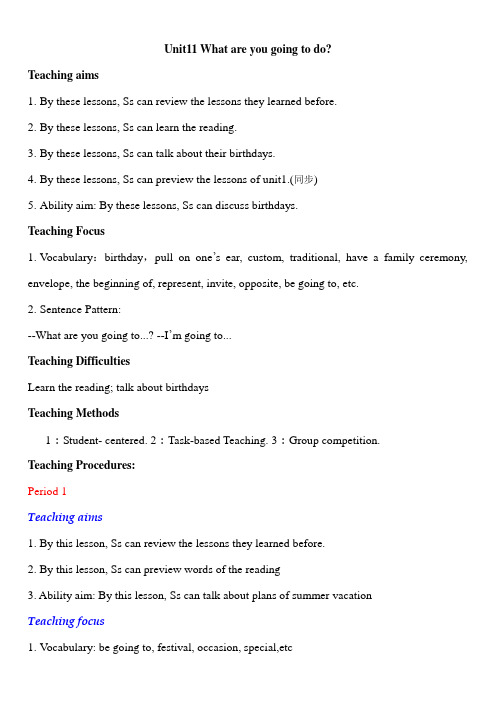
Unit11 What are you going to do?Teaching aims1.By these lessons, Ss can review the lessons they learned before.2.By these lessons, Ss can learn the reading.3.By these lessons, Ss can talk about their birthdays.4.By these lessons, Ss can preview the lessons of unit1.(同步)5.Ability aim: By these lessons, Ss can discuss birthdays.Teaching Focus1.V ocabulary:birthday,pull on one’s ear, custom, traditional, have a family ceremony, envelope, the beginning of, represent, invite, opposite, be going to, etc.2.Sentence Pattern:--What are you going to...? --I’m going to...Teaching DifficultiesLearn the reading; talk about birthdaysTeaching Methods1:Student- centered. 2:Task-based Teaching. 3:Group competition.Teaching Procedures:Period 1Teaching aims1. By this lesson, Ss can review the lessons they learned before.2. By this lesson, Ss can preview words of the reading3. Ability aim: By this lesson, Ss can talk about plans of summer vacationTeaching focus1.V ocabulary: be going to, festival, occasion, special,etc2.Sentence Pattern: Wh-questions with be going toTeaching difficultiesWh-questions with be going to; talk about summer vacationTeaching Methods1:Student- centered. 2:Task-based Teaching. 3:Group competition.Teaching Procedures:Step1: Revision1.Play the audio of unit11, Ss listen and follow to read2.Retell the conversation without looking at the book in groups----check3.Talk about plans of summer vacation by using wh-questions with be going to in pairs.4.DictationStep2: Preview the words of reading1.T shows new words of the reading, Ss spell to read the words in groups.1 ceremony /’seriməni/2 envelope /’envələup/3 relative/’relətiv/4 represent/repri’zent/ v.代表,表现5 Paris/’pæris/6 opposite/’ɔpəzit/2.T asks Ss to read the words3.Ss underline the words and write the meanings of the words on the book, some of the words aren’t writen on the worksheet, so T can shows pictures or examples to explain.Period 2-3Teaching aimsBy these lessons, Ss can learn the reading of unit11Teaching focus1. V ocabulary:birthday,pull on one’s ear, custom, traditional, have a family ceremony, envelope, the beginning of, represent, invite, opposite, be going to, etc.2. Sentence Pattern:--What are you going to...? --I’m going to...Teaching difficultiesLearn the readingTeaching Methods1:Student- centered. 2:Task-based Teaching. 3:Group competition.Teaching Procedures:Step1:Pre-reading1.T shows pictures and asks “Who are they? Where are they from?”2.Scan the article, and answer “How old is each person going to be?”----T asks Ss to answer the questions with the sentence “...is going to be...years old.”, and shows the answersStep2:careful reading1.Read the 1st paragraph, and fill in the blanks.(1)To celebrate her twenty-first birthday, Elena is going to ___________________with her friends.(2)Her friends are going to _________________21times, because it’s an old_________and her friends are very____________.Ss read the 1st para.carefully and fill in the blanks individually, then T asks Ss to read the sentences with answers, T shows the answers.2.Read the 2nd para. and chooseHow are her family and Yan-ching going to celebrate her 16th birthday? ( )A.Her family are going to take her out for dinner.B.They are going to have a family ceremony.C.She’s probably going to get some money in “lucky”envelopes from her relatives.D.She’s going to wear special clothes.E.Her mother is going to cook her noodles.Ss read the 2nd para.carefully and choose individually, then T asks Ss to read the sentences with answers, T shows the answers.3.Read the 3rd para. and aswer the questions.(1)What is kanreki in Japan?__________________________________________________________________(2)What presents do children give for the sixtieth birthday? Why?___________________________________________________________________(3)What presents are Mr. Aoki’s children going to give him?___________________________ Ss read the 3rd para.carefully and answer the questions individually, then T asks Ss to answer the questions, T shows the answers.4.Read the 4th para. and correct the sentences.(1)To celebrate the thirtieth birthday, Philippe is going to eat dinner out with his three relatives.(2)When you have a birthday in France, people often invite you out for dinner.Ss read the 4th para.carefully and correct the sentences individually, then T asks Ss to read thesentences andd tell the answers, T shows the answers.Step3:read &translate the article1.Plays the audio, Ss listen and follow to read the article.2.Ss read the article individually----T checks Ss to read the article.3.Ss look and retell the article without looking at the book4.Ss finish Task A individually with memory about the article, then T asks Ss to read the correct sentences.5.Ss translate the article in groups.----T asks Ss to read and translate----Ss translate some of the sentences.(1)To wish me a happy birthday, they’re going to pull on my ear 21times--once for each year. ___________________________________________________________________________ (2)I’m probably going to get money in “lucky” envelopes from relatives.__________________________________________________________________________ (3)The color red represents a new life, so children often give something red as a present._________________________________________________________________________(4)In France, when you have a birthday, you often invite people out.________________________________________________________________________ (5)In some countries, I know it’s the opposite--people take you out._________________________________________________________________________ Period 4Teaching aims1.By this lesson, Ss can talk about their plans of next birthday2.By this lesson, Ss can write something about their birthday.3.Ability aim: By this lesson, Ss canTeaching focusSentence Pattern: Wh-questions with be going toTeaching difficultiestalk about birthday and write downTeaching Methods1:Student- centered. 2:Task-based Teaching. 3:Group competition.Teaching Procedures:Step1: Pair work1.T: Last classes, we learn the reading about birthday customs in different places. Now let’s talk about your birthdays in pairs.Focus Ss’ attention on Task B, explain the task then T does a free talk with Ss.2.Ss ask and answer in pairs to make up their own conversations.---take showsStep2: WritingWrite a writing to introduce their next birthday.。
剑桥一级unit 11
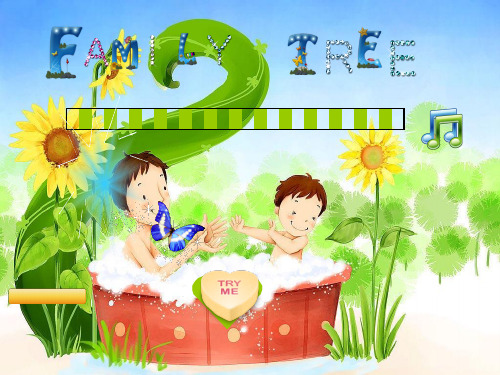
t前读长[u:],foot需要特殊记;(如:boot(靴子),tooth(牙齿),特例词:foot [u](脚);) 复合词中要读短,其余多数读长[u:];
l, s, d间读作[ʌ ],例外还要特殊记。(如:blood(血),flood(洪水)等.)
Thank you !
Nephew
niece
Cousin
reading a book
reading a newspaper
watching TV
drinking tea
holding a doll
eating fish
Hello! Hi! Good morning! How do you do ! Nice to meet you! This is my Dad. He`s reading a book.
Yes,she is watering the flowers now.And my grandpa is reading a newspaper.
Tony White
Kim White
Tom Green
Pat Green
brothers Tim Green Bob Green
sisters Sue White May White
Hello,nice to meet you.Take a seat, I`ll be down in a minute. Hello,Mum and Dad, I`ve got a Thanks! friend here. Is that your grandma? Hi,make yourself at home!
cousin Sam Who`s Nick`s dad?
cousin Ann Bob Green.
剑桥国际少儿英语1第11单元文本
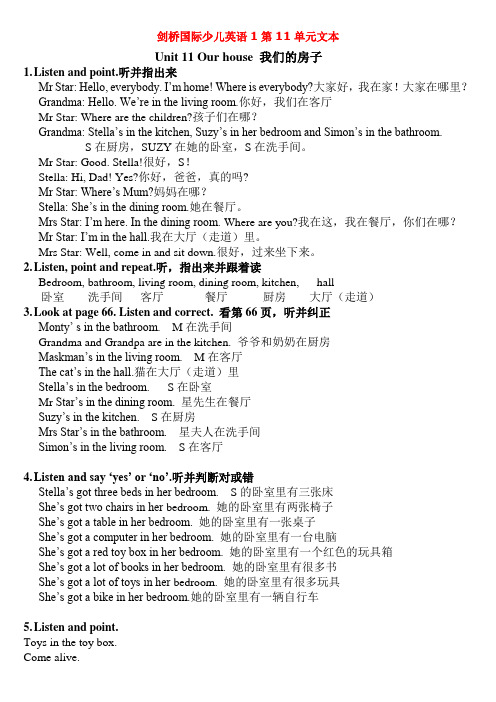
剑桥国际少儿英语1第11单元文本Unit 11 Our house 我们的房子1.Listen and point.听并指出来Mr Star: Hello, everybody. I’m home! Where is everybody?大家好,我在家!大家在哪里?Grandma: Hello. We’re in the living room.你好,我们在客厅Mr Star: Where are the children?孩子们在哪?Grandma: Stella’s in the kitchen, Suzy’s in her bedroom and Simon’s in the bathroom.S在厨房,SUZY在她的卧室,S在洗手间。
Mr Star: Good. Stella!很好,S!Stella: Hi, Dad! Yes?你好,爸爸,真的吗?Mr Star: Where’s Mum?妈妈在哪?Stella: She’s in the dining room.她在餐厅。
Mrs Star: I’m here. In the dining room. Where are you?我在这,我在餐厅,你们在哪?Mr Star: I’m in the hall.我在大厅(走道)里。
Mrs Star: Well, come in and sit down.很好,过来坐下来。
2.Listen, point and repeat.听,指出来并跟着读Bedroom, bathroom, living room, dining room, kitchen, hall卧室洗手间客厅餐厅厨房大厅(走道)3.Look at page 66. Listen and correct. 看第66页,听并纠正Monty’ s in the bathroom.M在洗手间Grandma and Grandpa are in the kitchen. 爷爷和奶奶在厨房Maskman’s in the living room.M在客厅The cat’s in the hall.猫在大厅(走道)里Stella’s in the bedroom.S在卧室Mr Star’s in the dining room.星先生在餐厅Suzy’s in the kitchen.S在厨房Mrs Star’s in the bathroom.星夫人在洗手间Simon’s in the living room.S在客厅4.Listen and say ‘yes’ or ‘no’.听并判断对或错Stella’s got three beds in her bedroom.S的卧室里有三张床She’s got two chairs in her bedroom. 她的卧室里有两张椅子She’s got a table in her bedroom.她的卧室里有一张桌子She’s got a computer in her bedroom.她的卧室里有一台电脑She’s got a red toy box in her bedroom.她的卧室里有一个红色的玩具箱She’s got a lot of books in her bedroom.她的卧室里有很多书She’s got a lot of toys in her bedroom. 她的卧室里有很多玩具She’s got a bike in her bedroom.她的卧室里有一辆自行车5.Listen and point.Toys in the toy box.Come alive.Walk and talk.On the count of five.One, two, three, four, five.Monty: What have we got here? OK. The children are sitting in the living room. Meera’s listening to music.我们看到了什么?孩子们正坐在客厅,M正在听音乐。
剑桥国际少儿英语第一册Unit11
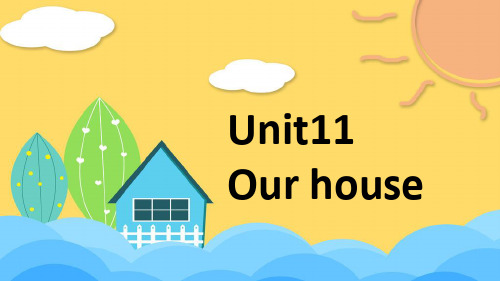
What’s Merra doing? She is listening to music.
What are Lenny and Alex doing? They are playing a game.
Where’s grandpa? In the dቤተ መጻሕፍቲ ባይዱning room.
What’s he doing? He’s eating fish.
What’s she doing? She’s reading a book.
Where’s Grandma? In the hall.
What’s she doing? Opening the door.
What is he doing? He’s playing football.
What is she doing? She’s playing tennis.
playing a game
What’s Stella doing? She is reading a book.
What’s Simon doing? He is drawing a monster.
What’s Suzy doing? She is colouring a picture.
Yum yum. Pencils! They’re my favourite food.
Shh. Where are Alex and Lenny? They are sitting on the sofa. They’re playing a game.
What’s Simon doing? He’s drawing a picture. What’s he drawing? He’s drawing a..a monster.
(完整版)最新最全剑桥三级上册Unit11
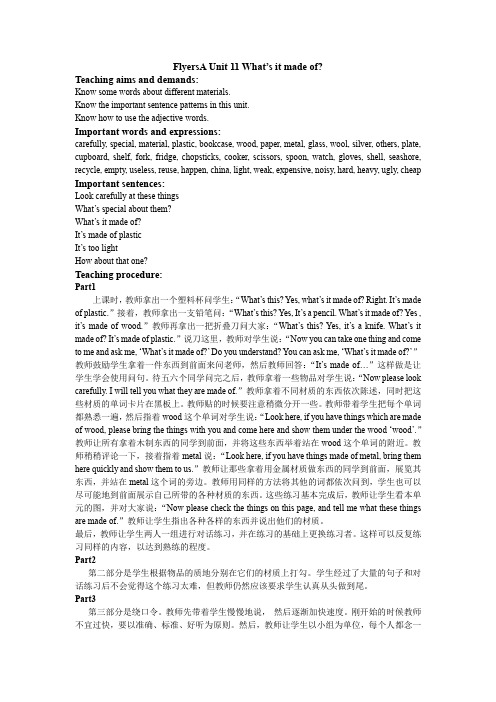
FlyersA Unit 11 What’s it made of?Teaching aims and demands:Know some words about different materials.Know the important sentence patterns in this unit.Know how to use the adjective words.Important words and expressions:carefully, special, material, plastic, bookcase, wood, paper, metal, glass, wool, silver, others, plate, cupboard, shelf, fork, fridge, chopsticks, cooker, scissors, spoon, watch, gloves, shell, seashore, recycle, empty, useless, reuse, happen, china, light, weak, expensive, noisy, hard, heavy, ugly, cheap Important sentences:Look carefully at these thingsWhat’s special about them?What’s it made of?It’s made of plasticIt’s too lightHow about that one?Teaching procedure:Part1上课时,教师拿出一个塑料杯问学生:“What’s this? Yes, what’s it made of? Right. It’s made of plastic.”接着,教师拿出一支铅笔问:“What’s this? Yes, It’s a pencil. What’s it made of? Yes , it’s made of wood.”教师再拿出一把折叠刀问大家:“What’s this? Yes, it’s a knife. What’s it made of? It’s made of plastic.”说刀这里,教师对学生说:“Now you can take one thing and come to me and ask me, ‘What’s it made of?’ Do you understand? You can ask me, ‘What’s it made of?’”教师鼓励学生拿着一件东西到前面来问老师,然后教师回答:“It’s made of…”这样做是让学生学会使用问句。
